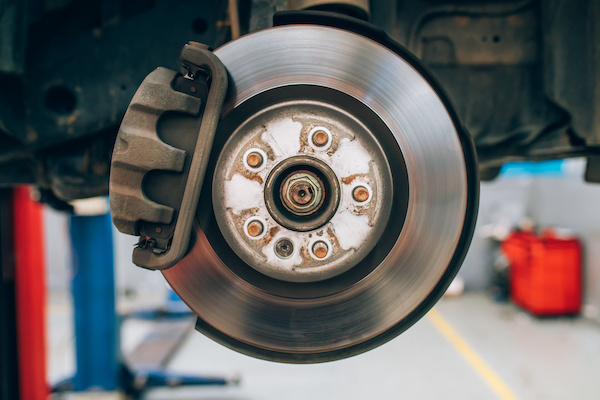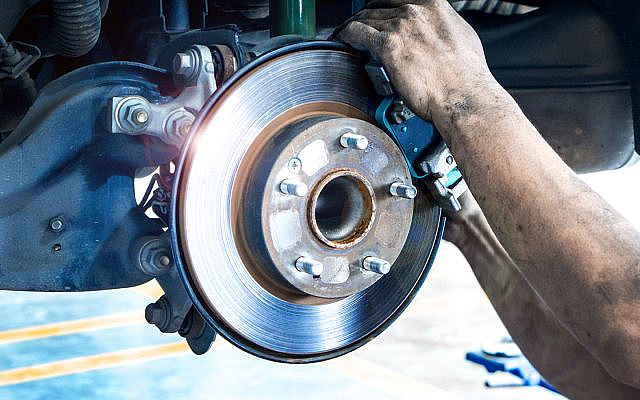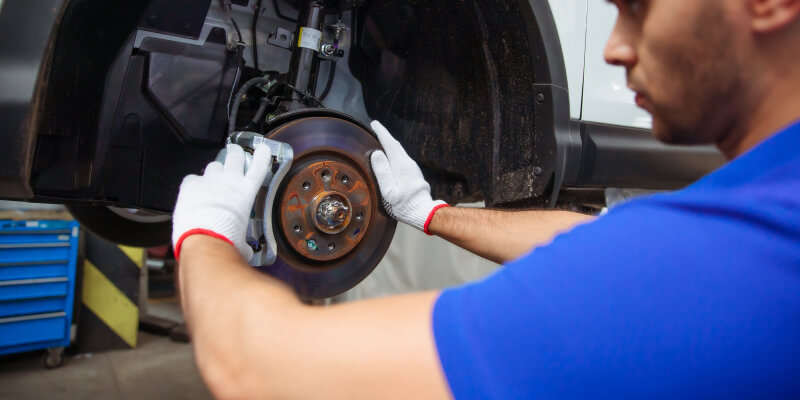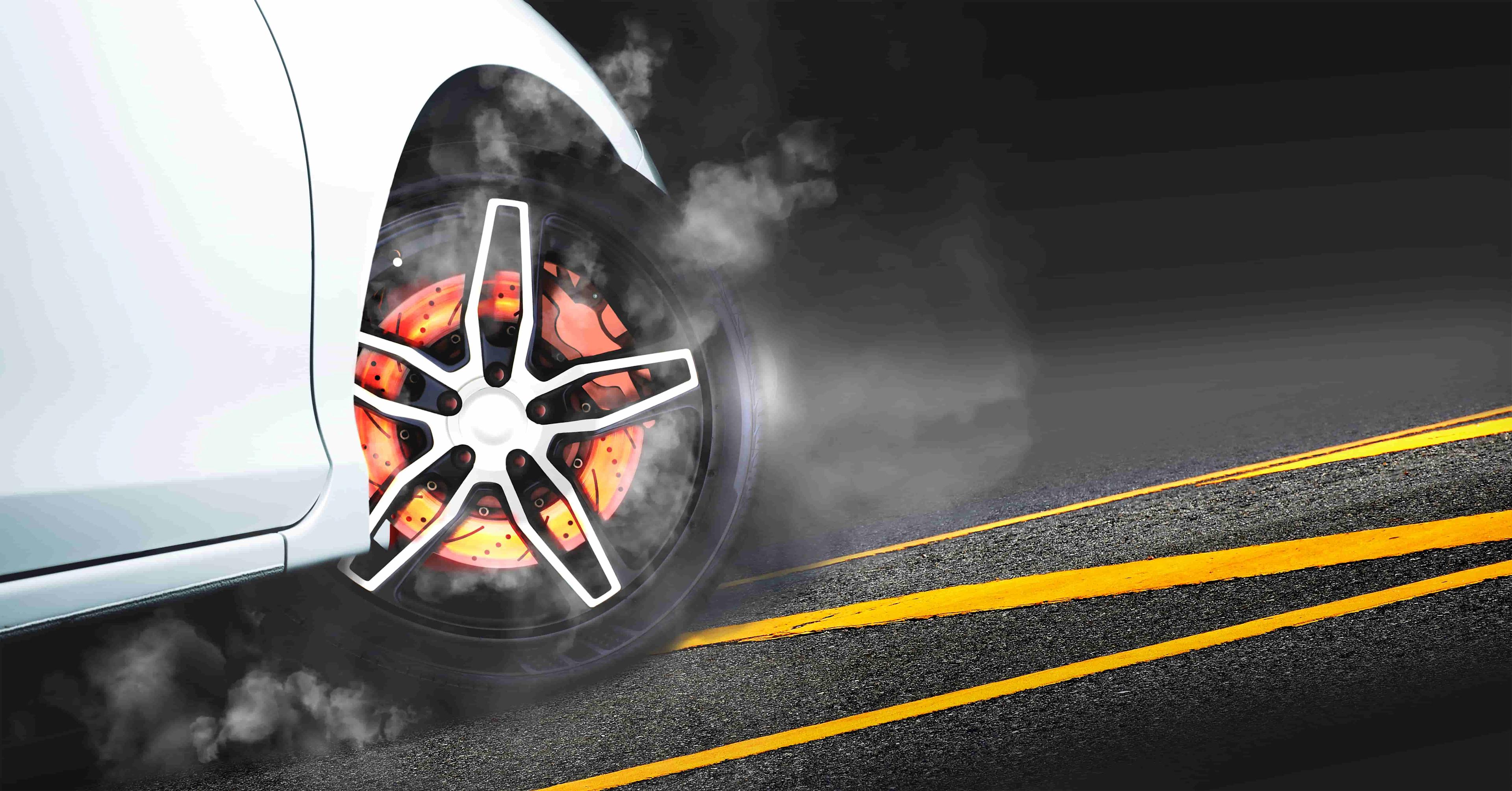Have you ever experienced a mysterious rumbling sound when you apply the brakes in your car? It can be quite alarming, especially if you're not sure what’s causing it. Understanding why your car rumbles when braking is essential for your safety and your vehicle’s longevity. In this post, we'll explore the common culprits of this unsettling noise and what it might mean for your ride. So, let’s dive in and shed some light on this automotive riddle!
Common Causes of Rumbling Noises

Rumbling noises when braking can stem from a variety of issues, some more serious than others. Identifying the culprit as soon as possible can help you avoid more significant problems down the road. Let’s take a look at some of the most common causes!
- Worn Brake Pads: One of the most frequent causes of rumbling sounds is worn-out brake pads. Over time, brake pads can become thinner and less effective, leading to metal-on-metal contact that creates a rumbling or grinding noise. Replace your brake pads regularly to avoid damage to your rotors.
- Warped Brake Rotors: If the brake rotors are warped, they won't maintain consistent contact with the brake pads. This uneven surface can produce a rumbling sound when braking, as the pads struggle to grip the rotors properly. Warped rotors often happen due to overheating or excessive wear.
- Brake Caliper Issues: The brake caliper plays a pivotal role in how the braking system functions. If a caliper is sticking or not functioning properly, it can cause uneven wear on the brake pads and lead to noises. A stuck caliper may not release properly after braking, contributing to rumbling when you try to stop.
- Contaminated Brake Pads: Sometimes, debris like dirt, moisture, or even oil can get into the braking system, contaminating the brake pads and rotors. This contamination can lead to poor performance and odd sounds when you apply the brakes. Keeping your brakes clean can help prevent this issue.
- Suspension or Wheel Bearing Problems: While this may not seem directly related to the braking system, issues with your vehicle’s suspension or wheel bearings can create rumbling noises that may mimic brake issues. It’s important to have your suspension system inspected if you hear noises while stopping, as it can affect your overall vehicle stability.
- Faulty Brake Hardware: The brake system is made up of various components, including shims, clips, and springs. If any of these components become loose or damaged, they can create noises when braking. Ensuring these hardware pieces are installed correctly is crucial for a noise-free experience.
While some of these issues may seem minor, they can lead to significant problems if left unchecked. It's essential to stay vigilant about your car's sounds and seek professional help if you notice a persistent rumble while braking. Regular maintenance goes a long way in keeping your vehicle running smoothly and safely!
Also Read This: How Long Was the Rumbling in Attack on Titan
3. Diagnosing the Source of the Rumble

So, your car is rumbling when you brake, and that's definitely not a sound you want to ignore. Diagnosing what's causing that noise can save you time and money down the road. Below are some steps you can take to pinpoint the source of the rumble:
- Pay attention to when the rumble occurs: Is it only when you hit the brakes, or does it happen when you're driving at different speeds? Noting the conditions can help narrow down the issue.
- Check the brake pads: Look for signs of wear. If they’re worn unevenly or have become too thin, they could be the culprit. Sometimes, you'll even see scoring on the rotor if the pads have worn down significantly.
- Inspect the rotors: Rotors can warp over time, especially if they overheat. Run your fingers over the rotor surface—if it's uneven and has grooves, it might need to be resurfaced or replaced.
- Evaluate the brake calipers: Sticky or malfunctioning calipers can contribute to a rumbling sensation during braking. If the caliper is sticking, it may not fully engage or release, causing uneven braking pressure.
- Check for loose suspension components: Sometimes, a rumble can emanate from parts of your suspension. Worn ball joints, bushings, or struts can amplify noises during braking.
If you're not comfortable making these assessments yourself, don't hesitate to take your car to a qualified mechanic. They have the tools and expertise to diagnose the issue accurately.
Also Read This: What Time Is WWE Royal Rumble 2024 Scheduled? Full Event Timings
4. Impact of Worn Brake Pads on Car Performance

Worn brake pads affect more than just the immediate comfort of driving—they can have a ripple effect on your car's overall performance and safety. Let’s break down why keeping an eye on those pads is crucial:
- Increased Stopping Distance: Worn brake pads reduce the effectiveness of friction needed to stop your vehicle. This means that every time you press the brake pedal, your stopping distance may increase, which can be dangerous, especially in emergency situations.
- Noise Production: As brake pads wear down, they often produce screeching or grinding noises. This is usually a sign that the pads are not only worn out but can also cause damage to your rotors, leading to more expensive repairs.
- Heat Generation: Worn pads create excess heat, which can lead to brake fade. When brakes overheat, their stopping power diminishes, making it more challenging to control your vehicle effectively.
- Potential for Brake Failure: Continuing to drive with significantly worn pads can lead to complete brake failure, which can be catastrophic. Regular checks can catch this before it becomes a serious issue.
- Impaired Handling: Worn brake pads can create uneven braking pressure, affecting your car’s handling. This can lead to steering instability, particularly under heavy braking.
To summarize, keeping an eye on your brake pads isn't just about comfort; it's about safety and maintaining your vehicle's performance. Regular inspections and timely replacements can help you avoid more serious problems down the road.
Also Read This: When I Move, It’s an Earthquake Rumble – Exploring Unusual Sensations
5. Effects of Warped Rotors on Braking

If you've ever felt a shuddering sensation when applying your brakes, chances are you might be dealing with warped rotors. But what exactly does that mean, and why is it such a big deal? Let’s break it down.
Rotors are the round metal discs that your brake pads clamp down on when you press the brake pedal. Over time, heat and wear can cause them to become warped, leading to uneven surfaces. This can result in several undesirable effects:
- Vibration or Shaking: One of the most noticeable symptoms of warped rotors is a vibrating steering wheel or brake pedal when you apply the brakes. This can be particularly pronounced at higher speeds. It's not just annoying; it can also be dangerous if not addressed.
- Reduced Stopping Power: Warped rotors can compromise the effectiveness of your brakes. The inconsistent contact with brake pads means you might not stop as quickly as you should, increasing your stopping distance and putting you and your passengers at risk.
- Excessive Pad Wear: When rotors are warped, the brake pads have to work harder to create friction. This uneven wear can lead to premature brake pad failure, which means you'll need to replace them sooner than expected.
- Increased Heat Generation: The irregular surface of a warped rotor often leads to excessive heat buildup during braking. This can cause brake fade, which means your brakes lose their effectiveness when they heat up too much, particularly during heavy use.
Regular inspections and maintenance are crucial to ensuring your rotors stay in good shape. If you start to notice any of these symptoms, it may be time to have your braking system checked out by a professional. Early intervention can save you time and money in the long run!
Also Read This: Why Can I Make a Rumbling Sound in My Ears? Causes and Solutions
6. Significance of Brake Caliper Issues
Let’s talk about another critical component of your braking system: the brake caliper. This part might not get as much attention as the rotors or pads, but it's just as vital — if not more so. Here’s why understanding brake caliper problems can keep you safe on the road.
The brake caliper is responsible for housing the brake pads and pushing them against the rotors to create the friction needed to slow your vehicle. But what happens when calipers start to malfunction? Here are a few issues you might encounter:
- Sticking Calipers: If a caliper becomes stuck, it can create uneven pressure on the pads, leading to uneven braking performance. This can cause your car to pull to one side while braking, obviously a significant safety concern.
- Leaking Brake Fluid: A caliper that’s leaking can result in a drop in brake fluid levels, reducing your braking power. Low fluid can lead to a spongy brake pedal, which is not something you want when you need to stop quickly.
- Worn Pads: If one caliper is functioning improperly, it can lead to uneven wear on your brake pads. This can result in needing to replace pads more frequently and can lead to further damage within the braking system.
Addressing brake caliper issues is essential not only for your vehicle's performance but also for your safety. If you suspect a problem, such as hearing unusual noises or feeling a difference in how your brakes respond, don’t hesitate to get them checked out. After all, brakes are one area where you absolutely want everything to be functioning perfectly!
Also Read This: How Rumble Pays You – A Breakdown of the Payment System
7. Understanding Suspension Problems That Lead to Rumbles
If you've ever noticed a rumble or clunking sound when you brake, it could very well be related to your vehicle's suspension system. The suspension is crucial for providing a smooth ride and maintaining control. If something's off, it can definitely translate into those annoying noises. Let's break down some common suspension issues that might be causing your car to rumble when you hit the brakes.
- Worn Out Shock Absorbers: Shock absorbers play a vital role in controlling the movement of your car's suspension. If they're worn, your car may bounce excessively and create unwanted noise when you brake.
- Damaged Struts: Struts, which support the weight of your car and keep the tires on the road, can also wear out. When struts are failing, they can lead to instability and an increased rumbling noise.
- Broken or Loose Bushings: Bushings are rubber components that cushion and allow parts of the suspension to move. If they become cracked or loose, they can create vibrations that you might hear as a rumble when braking.
- Steering Components Issues: Sometimes, problems with steering components can manifest as noise when braking. If your tie rod ends or ball joints are worn, it could affect braking performance and create rumbling sounds.
- Frame Misalignment: If your vehicle's frame is misaligned, the suspension won't work correctly. This misalignment can lead to uneven wear and noise during braking.
To sum up, having a properly functioning suspension system is essential for safe braking. If you're experiencing rumbling noises, it's advisable to get your suspension checked as soon as possible. Early intervention can save you from expensive repairs down the line and keep your ride smooth and quiet.
Also Read This: Where Can I Watch Rumble Fish? Streaming Platforms and Options
8. How to Identify Problems Early
Detecting car problems early can save you not only money but also headaches down the road. Fortunately, there are some simple steps you can take to keep an ear out for those rumbles that shouldn't be there. Here are some tips on how to identify issues before they escalate:
- Pay Attention to Unusual Noises: If you start to notice new sounds when braking—like a rumble or grinding—don’t ignore them! Your ears are your best tool for identifying problems.
- Conduct Regular Checks: Regularly inspect your brake pads, rotors, and suspension components. Look for signs of wear, such as uneven wear on brake pads or leaks around shock absorbers.
- Monitor Driving Feel: If your car feels different, whether it’s wobbling, shaking, or making rattling noises, it’s worth looking into. Changes in how your vehicle handles can be indicators of deeper issues.
- Stay Updated with Maintenance Records: Keeping track of regular maintenance can help you anticipate when parts may need attention again. This is especially true for brakes and suspension components that have specific lifespans.
- Seek Professional Help: If you're ever in doubt, don’t hesitate to take your vehicle to a professional mechanic. They have the tools and expertise to catch problems before they worsen.
Remember, being proactive with your vehicle can lead to a safer, more enjoyable driving experience. So, listen out for those rumbles, maintain your car properly, and don’t hesitate to get help when needed.
Also Read This: Does Rumble Have Monetization? Understanding How Creators Can Earn Money on Rumble
9. Steps to Take if You Experience a Rumble
So, you're driving along, and suddenly, that dreaded rumble kicks in when you hit the brakes. It can be alarming, but don't worry! There are several steps you can take to diagnose the problem safely before you decide on your next move.
1. Stay Calm and Assess the Situation
First, take a deep breath. If you notice the rumble while braking, it’s crucial to stay calm. Pause for a moment in a safe location, and turn off the engine if it feels necessary. It’s vital to know your surroundings so you can safely get your vehicle checked.
2. Listen and Feel
Pay attention to any other signs that accompany the rumbling. Is there a grinding noise? Do you feel a shudder through the steering wheel? Note these details—they can be incredibly helpful for a mechanic. Try to determine if the rumbling is consistent, or if it occurs only under specific conditions, like during hard braking or on rough surfaces.
3. Inspect Your Brakes
If you feel comfortable, get out and take a look at your brake system. Check for visible damage to the brake pads, rotors, or any loose parts. If your car has wheel covers, remove them and check the brake components, especially if you have any tools on hand. Keep an eye out for:
- Worn brake pads.
- Cracked or warped rotors.
- Fluid leaks.
4. Drive Slowly
If the rumble seems manageable and you feel safe, drive at a reduced speed to see if the noise persists. This is important because higher speeds can cause further damage if something is seriously wrong. Listen and feel carefully as you brake again; often, you’ll detect changes in the noise or vibrations.
5. Reach Out for Help
Once you've gathered as much information as possible, it’s often a good idea to reach out for professional help. If you’re uncertain about the state of your brakes, it’s better to be safe. Avoid driving the vehicle extensively until it’s checked out. Riding on malfunctioning brakes can severely compromise your safety and that of others on the road.
Also Read This: Who Won the Women's Royal Rumble in 2024?
10. When to Seek Professional Help for Your Car
Knowing when to seek professional help can save you time, money, and, most importantly, ensure your safety. Here are some key indicators that suggest it’s time to take your car to a mechanic for a thorough inspection.
1. Persistent Rumbling
If you've followed the initial steps but continue to notice a rumble when braking, it’s a strong signal that there’s an underlying problem. Especially if the noise is worsening over time, this is not something you want to ignore.
2. Unusual Sounds or Vibrations
Any new sounds like grinding, squealing, or scraping alongside the rumble can indicate that your brake components are failing. Similarly, if you feel unusual vibrations in the steering wheel or brake pedal, it’s essential to get those checked out immediately.
3. Warning Lights
If your car’s dashboard lights up with a warning related to your braking system, don’t dismiss it. Many modern vehicles have sensors to alert you when there’s an issue. Ignoring these warnings can lead to more significant problems.
4. Brake Fluid Leaks
If you notice any fluid pooling under your car, especially near the wheels or under the brake pedal, it’s time to call a professional. Brake fluid leaks can critically impact braking performance and should be addressed immediately.
5. You’re Not Sure What to Do
Sometimes, you might not feel confident diagnosing the issue yourself, and that’s perfectly okay! If you have any doubts about your vehicle's performance, it’s best to consult an expert. A mechanic will have the tools, training, and experience to properly diagnose and fix any problems.
In conclusion, being proactive about car maintenance and understanding the signs of trouble can help keep you safe on the road. If your car is rumbling when you brake, don't hesitate—address it sooner rather than later!
Conclusion: Keeping Your Vehicle Safe and Reliable
Maintaining a safe and reliable vehicle is essential for both your safety and the safety of others on the road. Understanding the reasons behind unusual sounds, such as rumbling when braking, can help you identify potential issues early and prevent serious damage. Here are some key points to remember:
- Regular Inspections: Schedule routine maintenance checks to catch early signs of wear and tear.
- Brake System Care: Pay close attention to your brake components, including pads, rotors, and fluid levels.
- Tire Condition: Ensure your tires are in good condition, as they contribute to overall braking performance.
- Seek Professional Help: Don’t hesitate to consult a mechanic when you notice unusual sounds or changes in handling.
Regular maintenance not only extends the life of your vehicle but also ensures that it operates safely. By staying proactive and addressing minor issues as they arise, you can prevent them from escalating into major problems that may compromise your vehicle's safety. Prioritizing these practices will help you maintain peace of mind every time you hit the road.
 admin
admin








